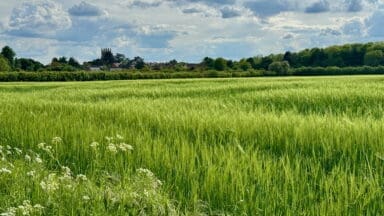
One of the regular writers for Scribehound Gardening, Alan Titchmarsh relays his concerns for the beauty of the countryside, which as he put it is “being hammered at the moment.”
“A kind of resilience; a degree of tenacity, a willingness to make the best of things, and, just as vital, an appreciation of the fact that beauty in the form of landscape and countryside is as vital to our daily life as the provision of electricity brought to our doorstep via a pylon that has been erected within 500 metres of our home. If energy is something to which I am entitled, is beauty of my surroundings not equally my birthright? Apparently not,” writes Titchmarsh.
Even though, he fully agrees that everyone is entitled to a home of their own with all amenities, we are losing the great outdoors – so paramount for the wellbeing of us all, wildlife and the environment. Access to nature, relieves the pressure on the NHS and “cherishes the earth that sustains us”, without which writes Titchmarsh, “we are lesser mortals and our planet a depleted resource”.
Emotively he goes on to explain that reports of it being “easy 50 years ago” to buy a house, are far from the truth. Titchmarsh explains that their mortgage was “two-and-a-half times my salary, which restricted our domestic choices in terms of both accommodation and location”. Strict frugality and working various jobs, where the “only avocado was the colour of the bathroom suite”, contradicts the assumption the baby boomer generation had it easy. Though, what made it worth while was access to beautiful countryside and a garden “in which to potter and be a small part of nature”.
“The countryside which, pre-industrial revolution (regarded as having occupied the century and a half between 1750 and 1900), sustained us body and soul is now looked upon as an under-used resource and, as a result, treated with the kind of cavalier approach that would make a city dweller’s blood boil were the same liberties taken in changing the metropolitan status quo. Now, in the countryside, it appears that beauty is of little consequence and treated with scant regard to its inherent desirability. Even food production is not a priority. Energy rules all: cover the fields of healthy, sustaining loam with solar panels to save fossil fuel. Use that fossil fuel instead to power ships that will bring to our shores from foreign lands with less stringent plant health regulations the food crops we no longer grow”, writes Titchmarsh.
As custodians of our gardens and surrounding landscape, Titchmarsh pleads for us all to cling to the belief that beauty matters. Soil matters. Not just for us but importantly, for all the generations that follow. “If we do not demonstrate clearly that beauty is the product of care; if we do not recognise its importance in our own lives, and the lives of all the plants and creatures with which we share our planet, then we might as well all go to the moon.”
“But we really must not lose hope; we must demonstrate by example, by enthusiasm and a passion for all that grows, that we will not bow down to a world where technology rules at any price; where landscapes can be tarnished by pylons and motorways in the name of progress. A way must be found in which the beauty of our surroundings is not sacrificed on that altar. So far that aim seems a vain hope.”
Note, access to the full article will require a Scribehound subscription.

